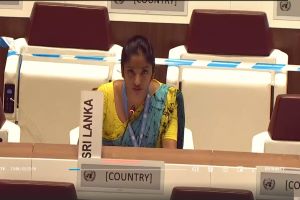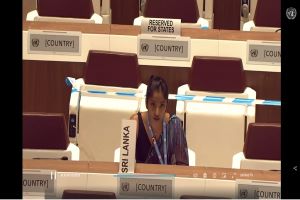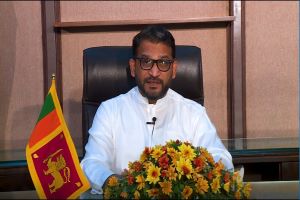
Sri Lanka fully supports the reference to international human rights law in the general considerations section. Given the possibility of autonomous technology to be used in situations of armed conflicts as well as in law enforcement situations, recognition of the relevance of international human rights law and criminal law is important. Principles of non-discrimination and human dignity are cardinal principles of international human rights law which have a direct relevance to our discussion today.
Secondly Sri Lanka supports a stronger emphasis on ethical considerations. While it is understood that ethical dimension is already included in the IHL principles, a separate paragraph on this issue, we believe is an important reinstatement. Decisions on human life are too important to be left to the blunt expedient of a mechanical judgment.

9 August, 2021
Mr. Chair,
We thank you for the draft elements paper on possible consensus recommendations circulated last Friday.
We have been engaged in discussions on technological, legal, military and ethical considerations of the development of autonomous weapon systems in this GGE forum since 2017. Over the years, a growing number of States have repeatedly flagged the alarming consequences of the challenges posed to fundamental IHL principles and humanity by the potential use of autonomous weapon systems and the urgent need for internationally agreed prohibitions and limitations.
During the discussion last Friday, some delegations re-iterated the need for our discussion to be based on the 11 guiding principles adopted in 2019, as reflected in the decision of the High Contracting Parties in 2019 , where it called upon the Group to consider the guiding principles, with a view to further develop and elaborate.

5 (a) An exploration of the potential challenges posed by emerging technologies in the area of lethal autonomous weapons systems to international humanitarian law
3 August, 2021
Mr. Chair,
Excellencies, Distinguished participants,
At the outset, Sri Lanka would like to congratulate you on your assumption of the Chair of the Group of Governmental Experts on LAWS and for the continuous engagement with states on this issue. Let me assure you Mr. Chair, of the full support and cooperation of my delegation as we approach the preparation of the recommendations of the GGE to the 6th Review Conference of the CCW.
Sri Lanka aligns itself with the position expressed in the Working Paper submitted by Venezuela on behalf of the Non-Aligned Movement (NAM) on possible consensus recommendations.
Since this session is dedicated to exploration of the potential challenges posed by LAWS to IHL, our remarks will be aimed at addressing this particular issue.


Mr. President,
Since this is the first time my delegation takes the floor during your presidency, the delegation of Sri Lanka extends greetings and convey sincere good wishes for every success. The delegation of Sri Lanka assures you of its fullest support and cooperation. Our thanks are extended to the distinguished panelists for their contribution to this discussion
While we regret that the Conference fails yet again to reach consensus on a programme of work due to apparent lack of political will, we consider this thematic debate an important opportunity to reiterate our principled position on agenda item 1 on cessation of the nuclear arms race and nuclear disarmament. This agenda item is of particular significance given the importance of the upcoming NPT review conference.
Mr. President,
Madam Secretary General and
Distinguished delegates,
I am pleased to join this important international forum to reiterate the importance Sri Lanka attaches to the Conference on Disarmament as the world’s sole multilateral disarmament negotiation forum. Our delegation assures you, Mr. President, of its full support and cooperation to find common grounds for fulfilling the Conference on Disarmament’s obligations towards strengthening international peace and security.
We take this opportunity to reaffirm Sri Lanka’s strong commitment and support for the complete elimination of nuclear weapons. Sri Lanka continues to remain concerned about the lack of progress on nuclear disarmament and the threat such weapons pose to survival of humanity.
Today, we are faced with one of the most challenging moments in human history. Like all obstacles, resolving the current crises requires renewed willingness to think and act collectively, especially to ensure the safety and security of the world we live in. The need for genuine efforts towards achieving this goal is now more important than ever.
- Sri Lanka Statement at the Plenary of the Conference on Disarmament 26 January 2021
- The Eighteenth Meeting of the States Parties to the Convention on the Prohibition of the Use, Stockpiling, Production and Transfer of Anti-personnel Mines and on Their Destruction
- Statements by Sri Lanka at the Meeting of the Group of Governmental Experts on Emerging Technologies in the areas of Lethal Autonomous Weapon Systems during 21-25 September 2020

